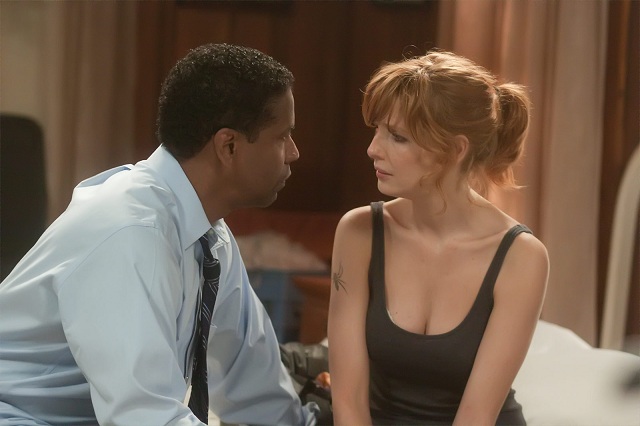 Flight, directed by Robert Zemeckis and starring Denzel Washington, offers a harrowing and honest portrait of addiction.
Flight, directed by Robert Zemeckis and starring Denzel Washington, offers a harrowing and honest portrait of addiction.
Washington stars as Whip, a brilliant airline pilot who suffers from a crippling alcohol dependency. As his life unravels, he meets Nicole (Kelly Reilly), a recovering heroin addict who proves to be one of the few stable forces in his life.
Reilly, 35, is enigmatic in a role that may be her breakout performance.
Women and Hollywood had the chance to ask the British-born actress about portraying an addict and the rarity of well-sketched female roles in Hollywood.
Women and Hollywood: You've said that you wanted Nicole to be "full of light" and not a stereotype of what a heroin addict would be. How did you work to give her such depth?
Kelly Reilly: Firstly, she wasn't written as a stereotype, which is always very helpful. She's described as being almost like a ghost. I played against the idea of a heroin addict. For her, it's not just about getting the hit and getting the high. She's using heroin to turn down the volume of reality and turn down whatever is going on in her life, whether it's her day-to-day reality or the fact that life isn't good right now and probably hasn't been good for a long time.
Heroin allows were to be in a lighter place even though it's killing her. She's lost. She's broken. But I wanted her to be soft. I wanted her to be feminine and in the scenes she's in with Whip, nurturing.
WaH: From what I understand, you constructed a rich backstory for Nicole in which her mother was a tremendous influence on her life and her father was an alcoholic.
KR: I don't do it with every character but I certainly wanted to do it with her and ask 'who is she? Where does she come from?' I definitely imagined her father as an alcoholic.
She's knows addiction, she knows alcoholic men. It's not by mistake that she recognizes Whip. People seek out what they know and she knows him. She doesn't judge him but I do think she's afraid of alcohol addiction and what that can bring out in men.
(There's a scene where) Whip passes out and she just stands their rooted to that spot she's in because she knows if she makes the wrong move she can get a clip round the mouth. She knows how to open his mouth so that he can breathe if he throws up. She turns his head and puts a blanket on him. She's someone who expertly knows this world.
WaH: It could be argued that this character shows people a different perspective on addiction.
KR: It means a lot to me to hear that because it's a role that you either get or you don't because some people think it's kind of a nothing role and I feel like they've missed it entirely. She's absolutely a female role. She's not a fantasy male character in a man's film. I never thought of her as an add-on girl part. To hear you say that makes me feel like I've done my job.
WaH: Would you say that Nicole is a rare example of a well-developed female character?
KR: I agree. That's what I felt when I read it. (The character) was all there but there were a few big blanks and it was up to me to fill them in. It was such a pleasure to be able to do that and to be able to come from a very female place. I needed women to relate to her.
WaH: Who are some actresses that you'd like to emulate career wise?
KR: So many really. Not necessarily careers but how they've approached roles with a level of integrity or courage. I love actresses who are brave and don't do what's expected of them or don't play off how they look or take risks. I adore Catherine Keener tremendously. I love strong women in films that are allowed to play women and not male fantasies. I love Jessica Lang, Laura Linney…there are so many. They have a general intelligence and are sort of unapologetic.
_____________________________
Justine Ashley is a pop culture reporter whose writing can be found on USA's Today's Happily Ever After blog, The Huffington Post, and Moviehole.net.






